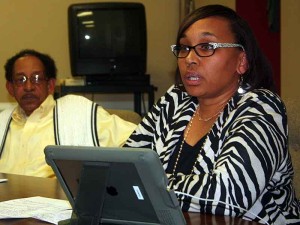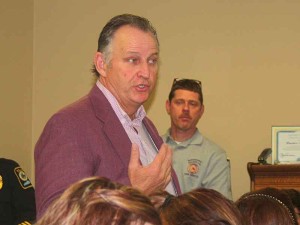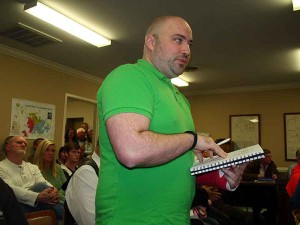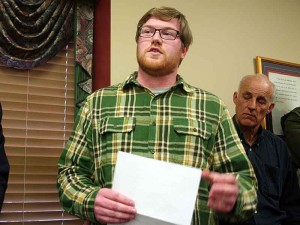Fairness ordinance language fails to find support among city council
By JIM BROOKS
Nelson County Gazette / WBRT Radio

Councilwoman Kecia Copeland discusses the proposed changes to the joint city-county human rights ordinance.
Tuesday, March 10, 2015, 11:55 p.m. — The proposed fairness ordinance language changes to the city’s human rights ordinance will not move forward in the wake of Tuesday’s city council meeting that featured citizen input on both sides of the debate.
The discussion of the human rights ordinance changes began with the council meeting room filled to capacity, and with more than a dozen more people standing in the hallway. Mayor John Royalty told those in attendance everyone would have the opportunity to speak.
Ten of the 14 people who addressed the council opposed the addition of fairness ordinance language to the existing human rights ordinance. The language would include protection from discrimination based on sexual orientation and gender identity.
Bardstown resident Michael Johnson questioned the need to add sexual orientation or gender identity to the ordinance, noting federal law and the majority of states have not yet done so. “What is the problem in Bardstown that needs to be fixed?” he asked.
If the human rights commission wants these changes, then they also have the burden of proof explaining why the changes are necessary, he said.
HRC board member Amelia Clements spoke as an individual of her concerns of the fairness ordinance language. The existing ordinance protects everyone as is, and she expressed concerned about the unintended consequences the changes may have. She cited three examples of businesses who were targeted and found guilty of discrimination of fairness ordinance language. She also said she was concerned that gender identity language may impact privacy in school locker rooms, showers and bathrooms.

Pastor Freddy Riggs spoke against adding fairness ordinance language in the joint city-county human rights ordinance.
Mike Yadon, a member of the human rights commission, spoke in favor of the fairness ordinance language. He told the council of a recent instance where a gay man suffered mistreatment from other people in his neighborhood in part because he was gay. He suffered continued harassment, with damage to his home and his vehicle. When he man turned to law enforcement for help, he was told officers would have to witness vandals in the act before citing them. The man later committed suicide, Yadon said.
“I’m here representing that person who cannot speak tonight, as well as the others who are afraid to be here for fear of losing family, their homes or their jobs,” Yadon said.
Fourteen-year-old Anna Lemke told the council that the proposed change goes against her personal beliefs. While it targets sexual orientation and gender identity discrimination, it can enable discrimination against people of faith, she said.
“Everyone is created equal, and we all have equal rights,” she said.

Matt Mercer speaking in favor of the proposed changes at Tuesday night’s meeting of the Bardstown City Council.
Matt Mercer cited Bardstown’s record of being a progressive community through the years and urged the council take action. “Take a stand that you do not tolerate discrimination in any form,” he said.
In her comments in favor of the changes, HRC Chair Kathy Reed highlighted Bardstown’s record of progress on social issues. Bardstown was the first Kentucky community to pass a comprehensive civil rights act in 1966. However, there are people who aren’t protected against discrimination currently, she said.
“Our ordinance is not where it needs to be,” she said. “We’re asking that you include these protected classes. We’re not asking you to vote on this today, we’re asking you to read it thoroughly and think about it.”
COUNCIL DISCUSSION. Discussion of the fairness ordinance language indicated little support among the members of the city council.
Councilman Fred Hagan said he would support changing the ordinance in order for it to match the Kentucky civil rights act, which includes protection for disability, age over 40 and familial status. “I would be willing to change the ordinance to mirror the civil rights act, but nothing more,” he said.
Councilmen Bobby Simpson and Bill Buckman supported leaving the ordinance as it was. Councilman Roland Williams said he understood what discrimination felt like, but he would not support the fairness ordinance language at this time.
Councilman Francis Lydian said existing law was sufficient protection against discrimination.
Councilwoman Kecia Copeland said she wanted to bring the proposed changes to the council to better educate the council as to what they are wanting to do. She had attended several commission meetings and felt it important to bring the issue to the council. “It was not up for a vote, but only for discussion,” Copeland said.
Speaking as chair of the Human Rights Commission, Kathy Reed said the commission would like the council to include protection from discrimination for the additional protected classes.
Reed said she expects state and federal law will eventually change to include sexual orientation and gender identity, and after noting the city’s progressive stance in the past, asked the council to consider moving forward with the requested changes.
Once the discussion phase ended, the council took no action.
-30-







